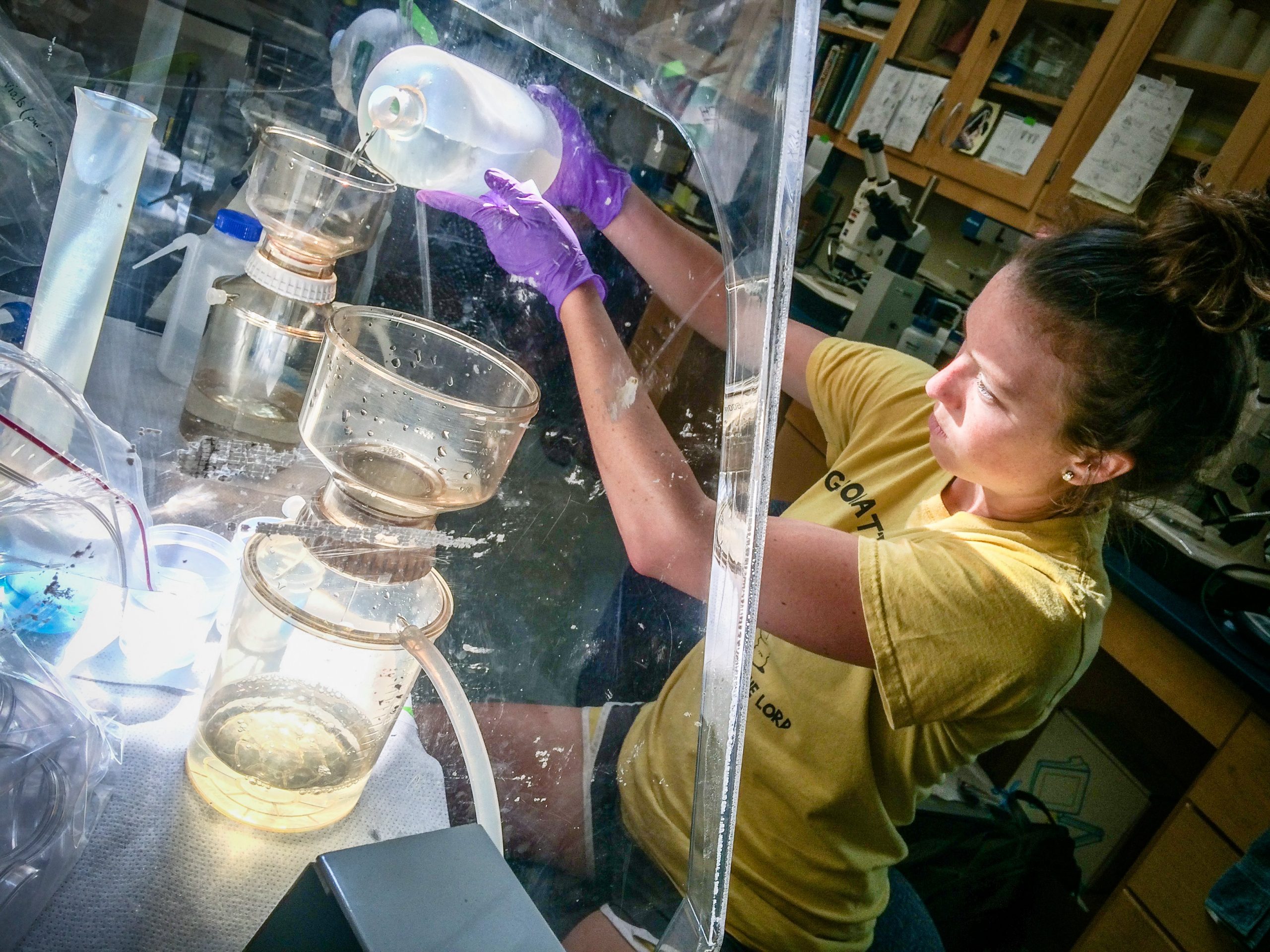In Emily Seelen’s first semester at Gustavus Adolphus College, she led a group project that focused on reducing waste on campus. Systematically measuring and testing each vending machine in every building, Seelen and her peers determined that an unnecessary amount of energy was being spent on machines with infrequent visits. In a short time, these machines’ lights were dimmed or removed completely, significantly saving energy across the campus.

Now, seven years later, the Gustavus alum is conducting research at Umeå University in Sweden after receiving funding through the National Science Foundation’s Graduate Research Opportunities Worldwide program, which was approved and partially funded by the Swedish Research Council.
Overseeing that initial class project her first year, Gustavus chemistry and environmental studies professor Jeff Jeremiason did not take long to recognize Seelen as a stand-out student and quickly asked her to work in his lab to help conduct research. During the rest of her time at Gustavus, Seelen’s passion and determination continued to open doors to opportunity after opportunity.
“At the beginning of her journey Emily did not realize how unique and talented she truly is,” Jeremiason said. “She is an extremely curious student and an avid learner with a passion to make a real difference, an exceptional combination.”
Seelen is currently pursuing a doctorate in oceanography from the University of Connecticut. Her dissertation research is focused on how mercury cycles through estuarine environments and what drives its transformation into a more toxic form, methylmercury. Seelen takes and studies samples from estuaries in New England to investigate how components of climate change may be influencing water column methylmercuy concentrations.
Now, in Sweden, she will be working with Dr. Erik Björn of Umeå University to research an isolated component of these waters, the organic matter, in a controlled laboratory setting to explore its role in methylmercury uptake by phytoplankton on a molecular level. At the end of this nine-month project, they are hoping to explain why organisms at the base of the aquatic food web take up more methylmercury in one environment than in another.

Seelen’s project abroad was made possible after she received the National Science Foundation Graduate Research Fellowship in 2014. A testament to Seelen’s continued success, this was not the first time she has been awarded an opportunity to study in a new location. In 2011, as a junior at Gustavus majoring in biology and environmental studies, Seelen was the recipient of an Environmental Protection Agency Fellowship. Under the EPA Fellowship, Seelen took her talents and research to Rhode Island the summer before her senior year in 2012.
“She is completely in tune with the environment and has a special appreciation for the world around her, making her an effective scientist wherever she goes,” Jeremiason said. “She is able to make the most of each place she is studying with her pure curiosity and talent.”
After leaving Gustavus for the East Coast and now the other side of the ocean, Seelen credits a lot of her success to her four years of liberal arts at Gustavus. Working directly with Jeremiason and geology and environmental studies professor Laura Triplett, Seelen gained invaluable hands-on experience in research and in the lab.
“In my classes at Gustavus, I learned to think at a holistic level, which is a necessary approach when studying oceanography,” Seelen said. “Working under Jeff and Laura, I gained confidence, problem solving skills, and the ability to analyze and discuss the results of my research in a scientific manner, skills that I do not take for granted.”
Seelen’s relationships with faculty at Gustavus were also integral parts of her path to graduate school. With the help of political science professor and former fellowships coordinator Alisa Rosenthal, Seelen was able to pursue her first fellowship that served to unlock many more opportunities. She also credits Jeremiason with helping her connect to her current adviser at University of Connecticut, Rob Mason.
However, her former professor is quick to turn the praise back on Seelen.
“Emily exceeded all expectations. She is able to make an impact in each thing she does,” said Jeremiason. “I completely trusted her to work independently and she absolutely thrived operating on her own.”
There is just one thing Seelen wishes she could change about her Gustavus experience.
“Now that I find myself in Sweden, I wish I would have taken advantage of the Scandinavian Studies program before I graduated,” she said.
As she reflects on her experiences and continues to grow her research, she plans to make bigger changes than to campus vending machines.
“Without my experiences at Gustavus, I would not have the skills required for all the different scenarios I have encountered in my post-graduate work,” Seelen explained. “I would like to pursue a career in academia to be able to both continue conducting research and also to share my passion for the environment with future students.”

Leave a Reply